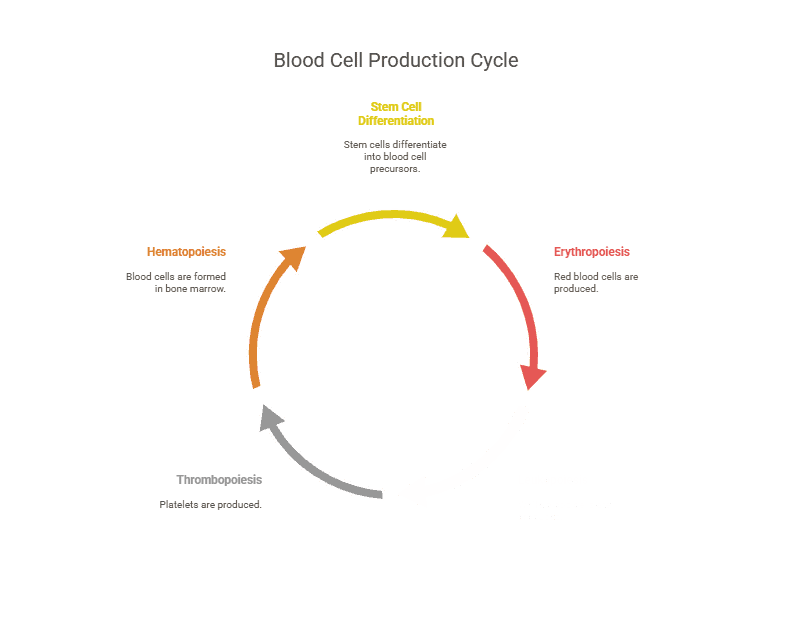The skeletal system is not only responsible for providing structure and support to the body but also plays a crucial role in the production of blood cells. Within the bones, specifically in the bone marrow, hematopoiesis occurs, which is the process of producing blood cells.
Types of Bone Marrow
There are two types of bone marrow: red marrow and yellow marrow. Red marrow is responsible for the production of blood cells, while yellow marrow mainly consists of fat cells. Red marrow is found in the cavities of spongy bone, such as the sternum, ribs, vertebrae, and pelvis.
Hematopoiesis
Hematopoiesis is the process by which blood cells are formed in the bone marrow. Stem cells, known as hematopoietic stem cells, have the ability to differentiate into various types of blood cells, including red blood cells, white blood cells, and platelets. These blood cells play essential roles in oxygen transport, immunity, and blood clotting.
Regulation of Blood Cell Production
The production of blood cells is tightly regulated by various factors, including hormones like erythropoietin and cytokines. Erythropoietin, produced by the kidneys in response to low oxygen levels, stimulates the production of red blood cells. Cytokines, on the other hand, are signaling molecules that control the proliferation and differentiation of blood cells.
Disorders of Blood Cell Production
Disorders related to bone marrow and blood cell production can have serious consequences on overall health. Conditions such as anemia, leukemia, and thrombocytopenia can result from abnormalities in hematopoiesis. Treatment for these disorders often involves bone marrow transplants, chemotherapy, or blood transfusions.
Summary
In summary, the bone marrow plays a vital role in the production of blood cells, which are essential for maintaining homeostasis in the body. Understanding the process of hematopoiesis and the regulation of blood cell production is crucial for diagnosing and treating disorders related to the skeletal system.
Key Takeaways:
- Bone marrow is a soft, spongy tissue found inside bones that produces blood cells.
- There are two types of bone marrow: red marrow, which produces red blood cells, white blood cells, and platelets, and yellow marrow, which stores fat.
- Blood cell production, also known as hematopoiesis, occurs in the bone marrow and is essential for maintaining proper blood cell levels in the body.
- Hematopoietic stem cells are responsible for generating all types of blood cells, including red blood cells, white blood cells, and platelets.
- Disorders affecting bone marrow and blood cell production can lead to serious health issues, such as anemia, leukemia, and immune system deficiencies.
Key Terms:
- Bone Marrow: The soft, spongy tissue found in the cavities of bones where blood cells are produced.
- Blood Cell Production: The process by which bone marrow generates red blood cells, white blood cells, and platelets.
- Hematopoiesis: The formation of blood cells within the bone marrow.
- Stem Cells: Undifferentiated cells that have the ability to develop into various types of cells, including blood cells.
- Erythropoiesis: The production of red blood cells within the bone marrow.
- Leukopoiesis: The production of white blood cells within the bone marrow.
- Thrombopoiesis: The production of platelets within the bone marrow.
